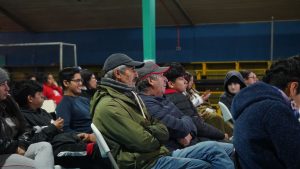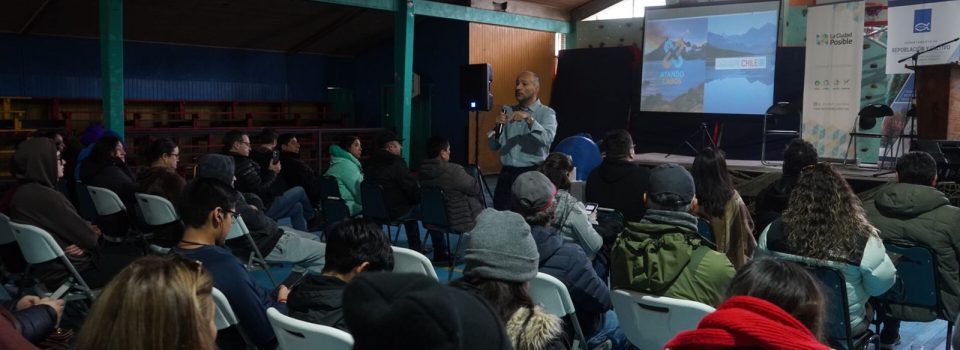Mitilicultura circular y regenerativa: Cochamó avanza en prácticas territoriales la actividad industrial
julio 5th, 2023 Enmarcado en el Pacto por una Región Sostenible e Inclusiva, se realizó en la comuna de Cochamó el primer seminario sobre Desafíos de la mitilicultura. La actividad contó con la participación de mitilicultores locales, el Gobierno Regional y actores del mundo privado que trabajan por soluciones circulares y regenerativas para esta importante industria.
Enmarcado en el Pacto por una Región Sostenible e Inclusiva, se realizó en la comuna de Cochamó el primer seminario sobre Desafíos de la mitilicultura. La actividad contó con la participación de mitilicultores locales, el Gobierno Regional y actores del mundo privado que trabajan por soluciones circulares y regenerativas para esta importante industria.
Este miércoles 28 de junio, se realizó el primer seminario: Desafíos de la mitilicultura en la comuna de Cochamó en el gimnasio municipal. En la actividad participaron mitilicultores de la comuna, así como otros agentes de Cochamó vinculados al desarrollo territorial, en el marco del Programa Mitilicultura circular y regenerativa, impulsado desde el Gobierno Regional de la mano del Pacto por una Región Sostenible e Inclusiva de la región de Los Lagos.
El objetivo del encuentro fue generar un espacio de capacitación en torno a los desafíos de la remediación de ecosistemas asociados a la acuicultura y a las soluciones circulares en la mitilicultura desde un enfoque territorial.
Organizado por el GORE en conjunto con mitilicultores locales y la Municipalidad de Cochamó, a la cita asistió Alex Godoy, investigador visitante del Centro Weatherhead para Asuntos Internacionales de la Universidad de Harvard. El investigador junto a Paulo Jorquera, Ingeniero Ambiental, gerente de remediación de ChucaoTec y experto en materia regulatoria ambiental acuícola y al Dr. Pablo Leal, Especialista en fisiología de macroalgas del Instituto de Fomento Pesquero (IFOP) participaron del panel “Desafíos en la remediación de ecosistemas asociados a la acuicultura”. En tanto, Iván Kripeos, gerente de operaciones de la zona sur de Atando Cabos y Carlos Aubert de Karün, fueron los encargados de exponer en torno a las soluciones circulares en la mitilicultura desde un enfoque territorial, en el segundo panel de conversación.
Los espacios dieron pie a la reflexión en torno a las articulaciones y la importancia que tiene para el desarrollo de las comunas el trabajo que se hace de forma articulada.
Para el Gobernador Regional, Patricio Vallespín:” El objetivo es poder implementar un programa en el marco del Pacto para una región sostenible e inclusiva para desarrollar y fortalecer las capacidades productivas de la pequeña industria mitilicultora de la región de Los Lagos, a través del acompañamiento técnico para fomentar el desarrollo productivo de triple impacto, social, ambiental y económico”.
En tanto, el alcalde de Cochamó, Silverio Morales reconoció la importancia de la mitilicultura como una fuente de desarrollo económico para la comuna. Sin embargo, enfatiza en que los mitilicultores toman con responsabilidad y compromiso el cuidado del medio ambiente: “El mitilicultor tiene consciencia de la importancia de cuidar el estuario, porque es la fuente de vida de todo este lugar. Hay que mantener el mar de forma prístina y cuidarlo sagradamente. Los mitilicultores están interesados y se hacen responsables de mantener el entorno lo más libre de contaminación posible”.
Por su parte, desde IFOP, el Dr. Francisco Cárcamo, Jefe del Departamento Repoblación Y Cultivo, destaca la relevancia de reconocer los entornos físicos y sociales en las actividades económicas. En ese sentido, agrega: “Cuando hablamos de sostenibilidad en el tiempo, se requiere sumar elementos como el cuidado del entorno donde se desarrolla, también elementos como la circularidad y regeneración. Por eso, estás instancias permiten abrir espacios colaboración y que los mitilicultores puedan ir adoptando nuevas prácticas y haciendo sostenible su actividad en el futuro”.
Para Mayling Yuen, co-fundadora y coordinadora para Chile de La ciudad posible, fundación que junto a Reversible apoyan en la gestión del programa, esta oportunidad es beneficiosa para pensar en los próximos pasos de la mitilicultura en la región. “Estamos seguros que el crecimiento sostenible de esta actividad económica permitirá penetrar mayores mercados por el cumplimiento de estándares de sustentabilidad, circularidad y regeneración, que aumentan su competitividad, y a su vez reducen los impactos negativos a su entorno natural y social”.
El encuentro cerró con la construcción desafíos y oportunidades para el desarrollo sustentable de la mitilicultura en conjunto con la comunidad, donde los mitilicultores valoraron la posibilidad de generar espacios para el desarrollo de mejores prácticas para el sector, haciendo del vínculo con la comunidad, un aliado no sólo para la comuna, sino en beneficio de la acuicultura local.
